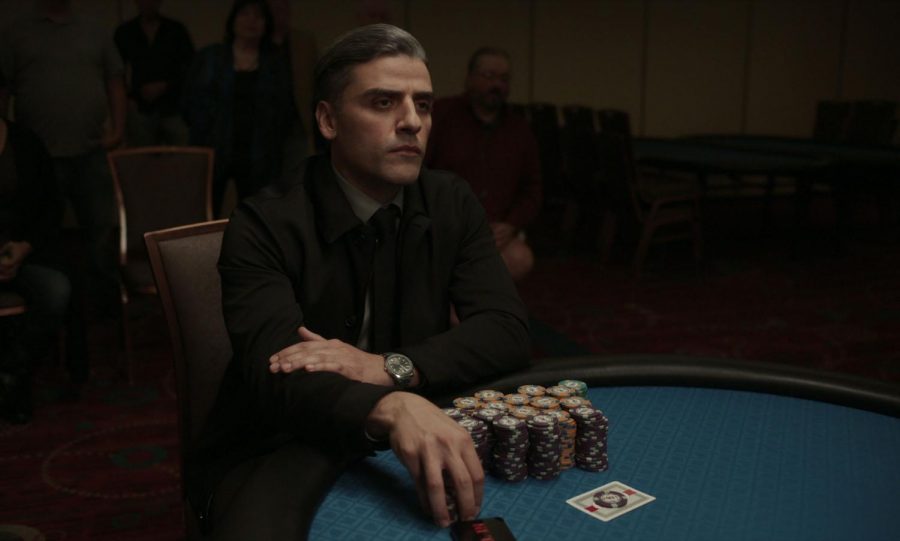Review: The sterile cynicism of ‘The Card Counter’
Paul Schrader’s latest is a slow burn whose engines could have used more revving.
Paul Schrader’s newest film, “The Card Counter,” follows blackjack player and former Abu Ghraib torturer William Tell (Oscar Isaac). Tell struggles to come to terms with his troubled past, even as he finds success in the present. (Image courtesy of Focus Features)
October 13, 2021
William Tell (Oscar Isaac) taught himself card counting, a strategy used to gain an advantage at blackjack. He developed this skill while in prison, serving time for being a torturer at Abu Ghraib in the early 2000s. At a casino, he walks into a press conference conducted by his former Abu Ghraib supervisor John Gordo (Willem Dafoe), who managed to escape prosecution despite being the one who supervised Tell’s torturing. Also at this conference is Cirk (Tye Sheridan), a young man down on his luck, who asks Tell to help him seek revenge on Gordo. Tell takes Cirk under his wing in hopes of preventing his revenge plan and tries to help Cirk escape his debt.
Paul Schrader’s previous film, “First Reformed,” had a surprisingly political message about balancing faith and climate change concerns. Many comparisons can be drawn between these two films. The most overt connection is how both leads sit down every night and journal over a drink, providing Schrader an opportunity to use voice-over to express their inner turmoil. Both films also tackle topical political concerns. While “First Reformed” was filmed in a more classic style, in the vein of the films of Carl Theodor Dreyer and Robert Bresson, “Card Counter” ditches old aspect ratios. It embraces the less flattering aspects of digital cinematography in a way that compliments the shiny aesthetic of the casinos the characters inhabit, reminiscent of season three of “Twin Peaks.” During the flashbacks to when Tell tortured Abu Ghraib detainees, Schrader employs an extremely disorienting wide angle lens that matches the jarring actions on screen.
Tell is a man of few words, and while his stoicism works often, much of the film consists of awkward dialogue that’s hard to get into. When Tell attempts to get to know Cirk on the drive to their first casino, the conversation feels unnatural, as though they were the only two at a party who didn’t know anybody. Tell’s love interest is La Linda (Tiffany Haddish), a woman who works to sponsor gamblers. Their relationship is underdeveloped and their chemistry not entirely believable. Her only purpose is to help him get a spot at the third act’s final poker tournament.
Right before the big game, Tell discovers Cirk still attempted to exact revenge, but Gordo won the fight. Tell takes part in the first half of the match, but leaves abruptly. This anticlimactic departure from the poker tournament avoids a predictable ending. At Gordo’s house, Tell challenges him to a fight in the other room, a fight which Schrader nevers shows, letting the audience imagine and draw their conclusions based on audio alone.
Tell wins the fight and calls the police to report himself. Later, La Linda visits him in jail. Schrader pulls out the same ending he’s used to several films: The two leads put their hands up to the barrier that separates them, a trope taken from Robert Bresson’s film “Pickpocket.” While some may find this ending uninspired, it works because it visualizes the protagonists’ separation from the world — how they can’t operate like others. It’s a cynical ending, and unfortunately it’s all too plausible in representing the failure of the justice system in real life.
Contact Sebastian Zufelt at [email protected].























































































































































